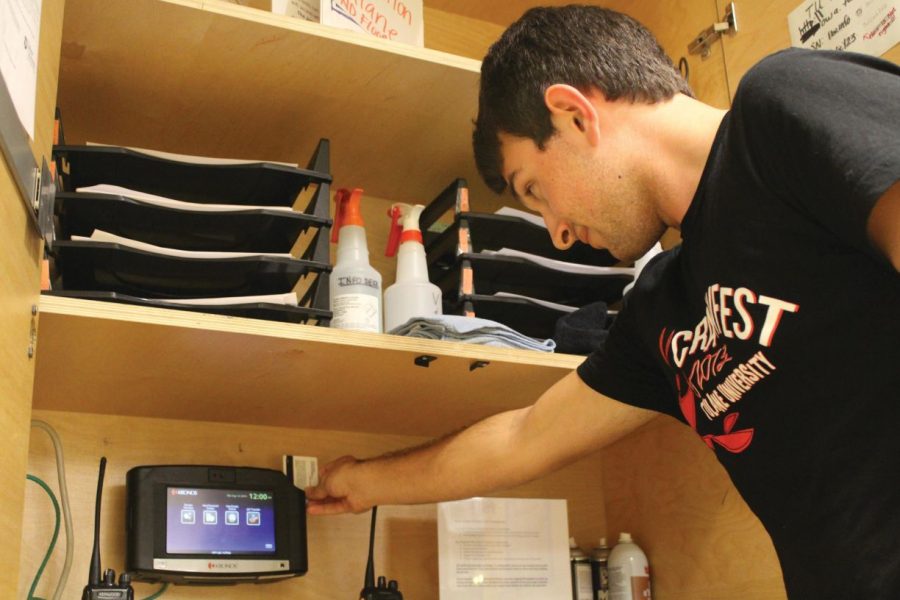University employees encounter technical issues in transition to digital timecards
September 11, 2013
Tulane’s Workforce Management Department moved employees to Kronos, a new, fully automated system introduced in July that regulates employees’ time and attendance. The switch was mandatory for exempt staff – those that are not eligible for overtime – as well as non-exempt staff and hourly student employees, including custodians, Reily Student Recreation Center employees, desk services coordinators, secretaries and Tulane bus drivers. Senior administration and faculty, however, do not use Kronos.
According to its website, Kronos is used by tens of thousands of organizations in more than 100 countries, including more than half of Fortune 1000 companies including Best Buy, Starbucks and Staples. Kronos systems are used in retail, government, healthcare, hospitality and manufacturing.
Jason Chretien, assistant vice president of the Workforce Management Organization, said that before the switch to Kronos, employees had been filling out handwritten time cards each week, a system that had been in place since 1986.
Kronos, also used by universities such as Cornell, Vanderbilt and Yale, claims to increase efficiency in tracking employees’ work time and attendance, allowing an employee to swipe his or her Tulane identification card at the clock. If employees have non-desk jobs, as custodians do, they can access a web-punch via mobile devices to record in and out times.
“To maintain a clunky, paper-based system just isn’t a viable option for an environment where you’re trying to control cost,” Chretien said. “Understand what your largest expense is, and that’s basically our payroll: We needed to get a handle on that. The return on investment for a business perspective was compelling, and that return on investment comes from reduced errors.”
Those errors could range from incorrect addition of hours of time worked to incorrect entry of hours worked or payment documents lost in the mail.
“When you have that many hands touching it and eyes viewing it, there’s always room for error,” said Doreen Nichols, associate vice president for the Workforce Management Organization.
“Only if it [was] solar powered could it be better,” said W. Ross Bryan, the assistant vice president for the division of student affairs for housing and residence life. “Do you know how much human capital I spend, just in my department, trying to get everybody’s time straight and pay all of our student employees? I think we’re the largest student employer on campus. It is a huge pain, and takes way too much time. Rather than pay another employee to make sure you [go to your job] I just want you to log in and log out, and then we’re done.”
Despite the advantages of an automated system, Bryan said that the biggest difficulties were in making the transition.
“The problems are pretty limited to getting all 200 employees [in Housing and Residence Life] over to the new system,” Bryan said.
Many employees requested to be quoted anonymously in The Hullabaloo in the interest of protecting their jobs. One student who works as a desk services coordinator said student employees are still dealing with those transitional issues.
“[My Kronos account] worked fine … but for some people it just wouldn’t let them sign in,” he said. “There was definitely talk of having to do paper time sheets.”
The student said one of the biggest issues was the system’s inability to distinguish multiple campus jobs if someone is more than one. He said it was especially problematic if the jobs are paid different rates.
“You make $7.25 here [as a desk services coordinator], but if you work at Reily you make $9,” he said. “The system would be confused about what job you were working in, so it might pay you the wrong amount, or it would come out of the wrong department’s fund.”
“I definitely think it’s more paperwork, more bureaucracy,” said Joe Steed, Lavin-Bernick Center facilities coordinator. “For those of us who have to use the time clocks, it seems like an added difficulty [is] always making sure everything is correct, and if it is incorrect, it’s a lot of work to have to fix it. In that case, I’d say it’s a little onerous.”
Some employees said they understood how Kronos could feel overbearing in application.
“If you work for the university for ten years, I think it would be a little bit demeaning to just go from just working to needing to document it [technologically],” one DSC said.
James Steele, another desk services coordinator, saw opportunities for technological error with the system.
“If you forget to clock out, you’re technically on the clock for the hours until you correct that,” Steele said. “Being a computer system, there’s a lot of risks that come with it. However, there is the advantage that it can be cross-referenced against the desk log.”
Nichols cited Kronos as part of Tulane’s green initiative. Rather than receiving a paper check, all employees use a wire transfer, the history of which can be accessed online.
Another Tulane student employee in the LBC found Kronos to be a positive change for Tulane but added that the system has its flaws.
“In this position, if we work more than six hours, we get 15 minutes of break,” she said. “More than [seven-and-a-half] hours, we get a 30-minute break. Before we didn’t have to clock out because … it’s a break! Now you don’t get paid for that time. You might as well leave 30 minutes early. It’s basically taking away the privilege [of] having a break.”
The university is in the final stages of implementing Kronos systems to all applicable employees and hopes to solve outstanding technical issues soon.










Leave a Comment